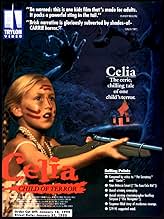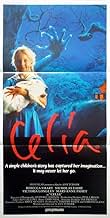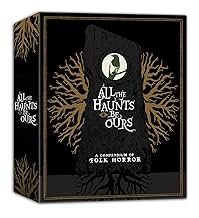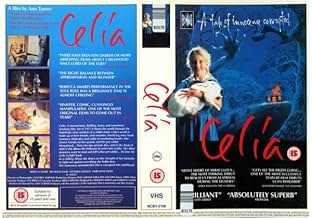NOTE IMDb
6,8/10
1,7 k
MA NOTE
Une jeune fille imaginative et quelque peu perturbée fantasme sur des créatures maléfiques et d'autres bizarreries pour masquer ses insécurités alors qu'elle grandit dans la campagne austral... Tout lireUne jeune fille imaginative et quelque peu perturbée fantasme sur des créatures maléfiques et d'autres bizarreries pour masquer ses insécurités alors qu'elle grandit dans la campagne australienne.Une jeune fille imaginative et quelque peu perturbée fantasme sur des créatures maléfiques et d'autres bizarreries pour masquer ses insécurités alors qu'elle grandit dans la campagne australienne.
- Récompenses
- 2 victoires et 2 nominations au total
Avis à la une
Celia is a spirited 9 year old girl with a vivid imagination.
Reeling from the death of her beloved grandmother, she seeks out the company of her new neighbours, The Tanners - a warm and loving family harbouring a secret.
Set in an Australian suburb in the late 1950's, the film tackles the prevailing social issues of the time including the "red scare" and the "rabbit pestilence", drawing a parallel between the two.
The film is essentially a drama, but with an added element of dark fantasy (which, although an interesting idea, is used inconsistently and often feels out of place).
But as a coming of age story, Celia is a triumph - an honest and unvarnished exploration of the trials and tribulations of childhood, featuring an astonishing performance by Rebecca Smart in the titular role.
Reeling from the death of her beloved grandmother, she seeks out the company of her new neighbours, The Tanners - a warm and loving family harbouring a secret.
Set in an Australian suburb in the late 1950's, the film tackles the prevailing social issues of the time including the "red scare" and the "rabbit pestilence", drawing a parallel between the two.
The film is essentially a drama, but with an added element of dark fantasy (which, although an interesting idea, is used inconsistently and often feels out of place).
But as a coming of age story, Celia is a triumph - an honest and unvarnished exploration of the trials and tribulations of childhood, featuring an astonishing performance by Rebecca Smart in the titular role.
"Celia" follows the title character, a young girl growing up on the outskirts of 1950s Melbourne during the "Red Scare." After her beloved grandmother's death, Celia, prone to fantasies and possessing an extreme imagination, begins to imagine the tumultuous world around her as plagued by fairytale monsters, inadvertently leading her toward tragic events.
This little-seen fantasy horror film from Australia was largely missed by audiences when first released, though it is due for some reevaluation. Writer-director Ann Turner offers here a vivid portrait of childhood loneliness that illustrates the ways in which serious matters of the "adult" world (here, Turner focuses largely on political turmoil) impact the psyche of impressionable youth.
The lead character is brilliantly portrayed by the young Rebecca Smart, and the film is underpinned by strong performances from the entire cast. In some ways, it recalls the dreamy nightmare world of something like "Lemora" or "Valerie and Her Week of Wonders," and in others, functions as a precursor to Peter Jackson's "Heavenly Creatures"--though in this case, it is an even younger child whose loose grip on reality hurls her toward oblivion. Despite the serious implications and consequences at hand, the film still manages to retain some lightness to it that makes it highly watchable, and, though often been classified as a horror film, it really plays more like a dark fantasy with tinges of the macabre.
The one downfall is that the film's conclusion does feel slightly irresolute given the established gravity of the situation, but "Celia" remains a stolid, effective portrait of a child whose alienation from the world around her is drawn in a way that adults can empathize with. After all, we were all children once, right? 9/10.
This little-seen fantasy horror film from Australia was largely missed by audiences when first released, though it is due for some reevaluation. Writer-director Ann Turner offers here a vivid portrait of childhood loneliness that illustrates the ways in which serious matters of the "adult" world (here, Turner focuses largely on political turmoil) impact the psyche of impressionable youth.
The lead character is brilliantly portrayed by the young Rebecca Smart, and the film is underpinned by strong performances from the entire cast. In some ways, it recalls the dreamy nightmare world of something like "Lemora" or "Valerie and Her Week of Wonders," and in others, functions as a precursor to Peter Jackson's "Heavenly Creatures"--though in this case, it is an even younger child whose loose grip on reality hurls her toward oblivion. Despite the serious implications and consequences at hand, the film still manages to retain some lightness to it that makes it highly watchable, and, though often been classified as a horror film, it really plays more like a dark fantasy with tinges of the macabre.
The one downfall is that the film's conclusion does feel slightly irresolute given the established gravity of the situation, but "Celia" remains a stolid, effective portrait of a child whose alienation from the world around her is drawn in a way that adults can empathize with. After all, we were all children once, right? 9/10.
Celia is a 9 year old girl with a lot of imagination. She lives with her family in South Australia in the fifties. She has a strong will, lots of charm and wit. Her family are communists, which makes them kind of outcasts in the society, and Celia has to fight mobbing schoolmates as well as discriminating teachers. She manages to do that very well. All this gives a rather frank and funny description of childhood problems, and Rebecca Smart plays her part extremely well. But Celia is not just a charming kid - when she hates, she really hates. And when she fantasizes about mysterious evil animals, she can't quite distinguish fantasy from reality. Which might seem rather normal, but Celia lives in a house, where a loaded gun is available... This movie is very entertaining, giving a varied picture of growing-up - and one can really feel the emotions and confusions, which is a part of being nine years old. At times the film becomes perhaps a bit too confusing - it can be quite difficult to follow the girls vivid imagination. But I'll guess, you have the same problem in the real world...
It is with a heavy heart that I note Celia, possibly my favourite film, is now being marketed with a tacky subtitle. This film is comparable to Jane Campion's work and is anything but a straight horror film, with a subtle characterisation and a compassionate yet unsentimental picture of childhood not generally associated with that genre. The narrative viewpoint is well sustained, with the grownup world of barbecues, blacklists, and affairs observed from a child's angle. The horror in question is in Celia's imagination, which, like that of all children, plays out the stresses of her own family and her culture. Various plagues - literal and metaphoric - impinge on her world, from myxomatosis to communism. Fans of blood and gore will be disappointed. The film is an unhurried portrait of 50s Australia, the pressure to conform, childhood, death. Its climax is sharp and bloody but logical; as is the lightness of the ending. As a touchstone, think of the daughter in the Piano, with her outrageous storybook lies, her spontaneity, her hurt rebellion, and her ultimate childishness. Just don't think Carrie. This is gem of a film, and let's face it, Hollywood churns out a lot of disappointing ones. As soon as you see the opening titles with Rebecca Smart's expressive face glancing all around her, while the theme music plays, you'll realise you're in the hands of a very talented director.
A very strange film that has been included in the, All the Haunts be Ours, compendium of 'folk horror' which is really what this is. There is and plenty that looks like a children film but it clearly is not that right and even at the early there are moments of 'horror'. I understand that in the video store people wanted to make clear that 'children' should not be allowed and then if as people are hope it will be gore and sex and maybe vampires, there is another problem. So lets just face this that children are in the film and realise that they do not always see the way we always do. The child, Celia is most imaginative and can influence other children and this can make it difficult for them. The film also has the killing rabbits, the communists, cruel parents and police men and school teachers who can be even more so.
Le saviez-vous
- AnecdotesThe fairy tale from which extracts were recited in the film was The Hobyahs by James H. Fassett and Robert D. San Souci.
- GaffesThe burn mark on Celia's rabbit is missing at the fishing docks.
- ConnexionsFeatured in Film Review and Interview with Ann Turner from the 'Sunday' Show (1989)
Meilleurs choix
Connectez-vous pour évaluer et suivre la liste de favoris afin de recevoir des recommandations personnalisées
- How long is Celia?Alimenté par Alexa
Détails
- Date de sortie
- Pays d’origine
- Sites officiels
- Langue
- Aussi connu sous le nom de
- Celia: Child of Terror
- Lieux de tournage
- Société de production
- Voir plus de crédits d'entreprise sur IMDbPro
- Durée1 heure 42 minutes
- Mixage
- Rapport de forme
- 1.85 : 1
Contribuer à cette page
Suggérer une modification ou ajouter du contenu manquant

























